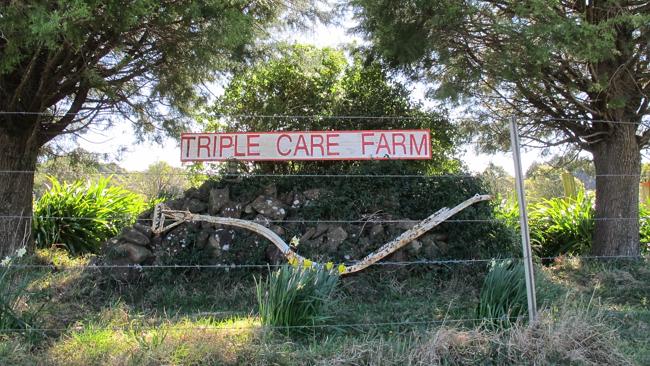Triple Care Farm: Why drug addiction and mental illness need to be managed together
THIS is a story about a young athlete whose struggle with heroin, ice and mental illness almost killed him - and led him to the only place in Australia that cares.

SEVENTEEN-year-old Luke* used to be a junior professional snowboarder. He grew up in a loving family, went to a good school, and had a lot of friends. But when an injured ankle sustained on tour two years ago put him out of the game indefinitely, life got too much.
"I just wanted to escape from everything. I didn't want to be a part of this world, I didn't want anything to do with my family. I wanted to do stuff with my friends but my friends didn't want to do stuff with me because I wasn't the same," he tells news.com.au.
"I was sick of crying in class, crying myself to sleep, crying all the time. I couldn't handle my emotions, just the littlest things set me off."
Luke was diagnosed with depression and not long after he turned to drugs.
"I thought drugs would help. I just knew that when you smoke weed you can't really talk, so I started to smoke weed. Then I found I couldn't think. So I would smoke ice so I could do stuff and it would pump me back up. But then I hated being on that because it was scary, so I would take a whole bunch of acid to just chill out and trip in some like, fantasy land. But then I'd have a huge comedown so I'd get on opioids, taking heroin and stuff. Prescription pills if I could get them so they'd make the experience two times, ten times stronger. My goal in life was to take drugs. That's it."
That was before Luke enrolled at Triple Care Farm, a residential rehabilitation service provided by the Sir David Martin Foundation and Mission Australia on the NSW southern highlands.
When Luke started at the Farm, he was "coming off every drug except cocaine". Now, ten weeks later, his goal in life has changed dramatically. He's been clean since enrolling at the Farm. He's looking forward to getting his licence when he leaves, wants to complete his Certificate Two at TAFE (which is equivalent to Year 12), and plans to get a trade apprenticeship.
"Hopefully by the start of 2015 I'll be working, driving, making a living - that's kind of the goal now. I'm just really looking forward to being well again. I've been trying as hard as I can. I've been getting along with my mum and dad really well, whereas before we hadn't stopped arguing for three years. I'm interested in them and I'm interested in their lives, whereas before it was all about me. And they're stoked that I'm coming back as their son, who respects and loves them as much as they do me. I've just kind of realised that this is the place for me to change, and so that's what I've been doing."
Nicole Sullivan, clinical psychologist at Triple Care Farm, agrees. "What we provide [these kids] is a safe place for change," she says.
"Coming here means they have made one of the hardest and most important decisions of their lives - to give up drugs and turn their lives around."

The program's voluntary admission might have something to do with its success rate, but the treatment participants enter into is hard. Real hard.
Initially, family and friends are left behind. There are no phones, no internet and no television. Boot camp is compulsory as are counselling sessions. Weekend passes are given out when students pass through a certain stage, and they are encouraged to commit to a three-month stay and six months of follow-up treatment. They are also expected to work on the farm, live in shared accommodation, and go through several kinds of therapy classes including art and music.
News.com.au was invited to witness one of the therapy sessions first hand. The session begins when a young man, Chris*, stands up, confidently moves towards the centre of the room, and announces he's going to take the group through a mindfulness technique. He speaks well, seems educated, and bears the clothing, stubble and tied back ponytail familiar to any inner-city hipster.
He paints a picture of a beautiful rainforest, a running stream, peaceful noise. But, of course, we're not at an inner city poetry reading - indeed, we're not even in the city.
Chris is just one of the 100 people aged between 16 and 24 who come through the Farm each year, seeking treatment for drug and alcohol addiction.
Like Luke, Chris holds the same ambitions and dreams as every other school-aged Australian. But somewhere along they way, he became addicted to a substance, and reached the stage where life became unbearable.
Of the people who come through the Farm, all have a substance misuse issue. In addition to that, 85 per cent suffer from some form of mental illness, including but not limited to schizophrenia, bipolar disorder and depression. Shockingly, 75 per cent tried to commit suicide in the twelve months before being admitted.
The link between drug and alcohol abuse and mental health problems is not a new concept - in fact, it even has a name: co-morbidity. One in four young people experience a mental health condition over any 12 month period - that is the highest prevalence of any age group - and among this group, approximately half suffer from a substance use disorder. That's a huge proportion of Australia's youth.
But while the situation is not a new thing, treatment facilities that address both mental health and substance abuse are. Triple Care Farm is the only Australian residential rehabilitation program of its kind, providing an "integrated and individual treatment program."
"Most services offer young people with drug and alcohol problems help with either their addiction or their mental health, not both," says Mission Australia's CEO, Toby Hall.
"For young people, addiction and mental illness are very often related. They need to be managed together, not separately. What we provide at Triple Care Farm is a combination of both drug and alcohol rehab and mental health services."

And the proof the program works is in the pudding.
"Semester One's intake this year has seen 100 per cent of our graduates now in stable accommodation," says Sullivan.
"Over 70 per cent are now engaged in employment and training. We get people back to a good fitness level - if they're fitter, they're more likely to abstain from substances when they leave" she says.
Follow up statistics on graduating students also show that only six per cent used alcohol at a chronic level in the three months since leaving the program. At intake, cannabis is the main drug of concern for over half the students - in the six months after leaving, only four per cent reported using the drug again.
"I actually can't believe how much this place has done for me," says Luke. "I didn't really notice until a couple of weeks ago that I actually am levelling out and becoming myself again. I just feel really happy.
"I just can't wait to keep living my life, really, and putting this behind me - not forgetting about it because I've learnt so much - but moving on. Not dwelling on all that stuff but just keeping walking forward. "
Triple Care Farm receives more than 6000 inquiries for support every year. They have room to accept only 100. In addition to this, prior to being accepted, students have to go through a detox program at their local public hospital, alongside middle-aged men and women with chronic addiction problems. Many of these detox programs have waiting lists as long as three months. Add that to the demand on the Triple Care Farm program, and there is no doubt that there is a national shortage of youth-specific detox facilities in the public health system. So what can you do about it? You can donate.
Currently, Triple Care Farm receives only 19 per cent of its funding from the government - the rest comes from people like you. Undoubtedly their biggest fundraising initiative is the AMP Abseil for Youth event, which is taking place on the 18th and 19th of October. You can enter the abseil or sponsor someone else to do so, with the money raised going towards the running of the Farm. Just imagine the difference your financial support could make not only to the students like Chris and Luke who are accepted, but towards increasing the program's capacity for the future.
To find out more, visit the website: http://ampabseilforyouth2013.gofundraise.com.au/cms/home
*Names have been changed for privacy reasons



